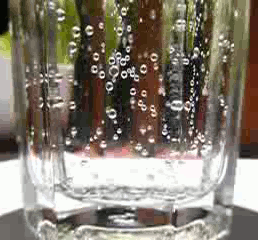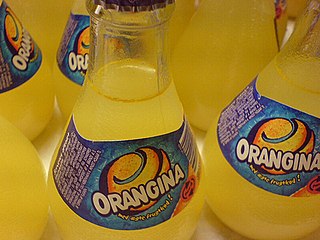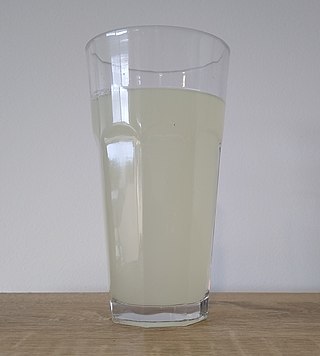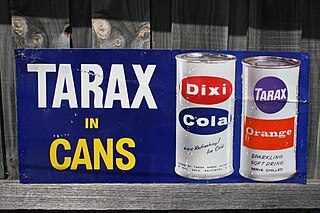Rondo was a citrus-flavored soft drink available in limited U.S. markets in the late 1970s and early 1980s, one which was "blended from fine essences", and "lightly carbonated". It is mostly famous for its slogan - "Rondo---The Thirst Crusher" - as well as its commercials, featuring people crushing the cans in various ways. The cans featured bright yellow packaging for regular Rondo and green packaging for Diet Rondo. It was introduced in 1978 by Cadbury-Schweppes.
Schweppes sells a similar drink in Australia under the name Solo. [1]
The drink and its name were parodied in the 2006 film Idiocracy as "Brawndo: The Thirst Mutilator".
In 2023 Rondo returned for sale in the U.S. market. The can design retains much of the original colors and look and feel with some slight changes.[ citation needed ]

A soft drink is any water-based flavored drink, usually but not necessarily carbonated, and typically including added sweetener. Flavors used can be natural or artificial. The sweetener may be a sugar, high-fructose corn syrup, fruit juice, a sugar substitute, or some combination of these. Soft drinks may also contain caffeine, colorings, preservatives and other ingredients.
7 Up or Seven Up is an American brand of lemon-lime–flavored non-caffeinated soft drink. The brand and formula are owned by Keurig Dr Pepper, although the beverage is internationally distributed by PepsiCo except the UK where it is distributed by Britvic, PepsiCo's designated UK distributor.

Carbonated water is water containing dissolved carbon dioxide gas, either artificially injected under pressure, or occurring due to natural geological processes. Carbonation causes small bubbles to form, giving the water an effervescent quality. Common forms include sparkling natural mineral water, club soda, and commercially produced sparkling water.

Orangina is a lightly carbonated beverage made from carbonated water, 12% citrus juice, as well as 2% orange pulp. Orangina is sweetened with sugar or high fructose corn syrup and in some markets with artificial sweetener. Natural flavours are also added.

Cream soda is a sweet soft drink. Generally flavored with vanilla and based on the taste of an ice cream float, a wide range of variations can be found worldwide.

Crush is a brand of carbonated soft drinks owned and marketed internationally by Keurig Dr Pepper, originally created as an orange soda, Orange Crush. Crush competes with Coca-Cola's Fanta. It was created in 1911 by beverage and extract chemist Neil C. Ward. Most flavors of Crush are caffeine-free.

Schweppes is a soft drink brand founded in the Republic of Geneva in 1783 by Johann Jacob Schweppe; it is now made, bottled, and distributed worldwide by multiple international conglomerates, depending on licensing and region, that manufacture and sell soft drinks. Schweppes was one of the earliest forms of a soft drink, originally being regular soda water created in 1783. Today, various drinks other than soda water bear the Schweppes brand name, including various types of lemonade and ginger ales.

Mirinda is a brand of soft drink that was created in Spain in 1959 and has been distributed globally by PepsiCo since 1970. Its name comes from the Esperanto translation of "admirable" or "amazing".

Diet Pepsi, currently stylised in all caps as PEPSI DIET, is a diet carbonated cola soft drink produced by PepsiCo, introduced in 1964 as a variant of Pepsi with no sugar. First test marketed in 1963 under the name Patio Diet Cola, it was re-branded as Diet Pepsi the following year, becoming the first diet cola to be distributed on a national scale in the United States. In the 1960s and 1970s, its competition consisted of the Coca-Cola Company's subsequently discontinued Tab. The United States represents the largest single market for Diet Pepsi.

Sun Drop is a citrus-flavored soft drink produced by Keurig Dr Pepper with a yellowish-green color. Among soft drinks, it is known for its high caffeine content. Orange juice concentrate is an ingredient in the drink. Bottled Sun Drop uses real sugar cane, which contains some "pulp" giving Sun Drop its distinct flavor and appearance. Sun Drop competes primarily against the Coca-Cola Company's Mello Yello and PepsiCo's Mountain Dew.

Orange soft drinks are carbonated orange drinks.

Solo is an Australian, lemon-flavoured, carbonated soft drink currently manufactured under license by Asahi Breweries. First launched by Tarax in 1968 and fell to Cadbury after a takeover in 1974, its lemon flavour is inspired by Australian pubs' traditional and popular non alcoholic 'pub squash' beverage. The drink's recognition amongst the Australian population has been attributed to the brand's long lasting "Solo Man" marketing campaign, featuring numerous Australian actors. Solo and Asahi Holdings operates in the soft drink manufacturing industry along with various other brands such as Coca-Cola. The usual 375mL can of Solo contains 43.1 grams of sugar. There are and have been in the past, various versions of Solo available. These include Solo Zero, which uses artificial sweetener instead of sugar and there has also been a lemon and lime flavoured variant of the original recipe.
Claytons is the brand name of a non-alcoholic, non-carbonated beverage coloured and packaged to resemble bottled whisky. It was the subject of a major marketing campaign in Australia and New Zealand in the 1970s and 1980s, promoting it as "the drink you have when you're not having a drink" at a time when alcohol was being targeted as a major factor in the road death toll. The jingle was written by Australian social satirist John McKellar.

Tarax is an Australian brand of soft drink, available in several flavours, and sold in cans and bottles.

Dr Pepper is a carbonated soft drink. Dr. Pepper was created in the 1880s by the American pharmacist Charles Alderton in Waco, Texas, and was first nationally marketed in the United States in 1904. It is manufactured by Keurig Dr Pepper in the United States and Canada, by The Coca-Cola Company in the United Kingdom, Japan, and South Korea, and by PepsiCo in Europe. Variants include Diet Dr Pepper and, beginning in the 2000s, a line of additional flavors.
Cole Cold is a line of soft drinks produced by S. M. Jaleel and Company in Trinidad and Tobago. It is available in banana, diet banana, pear, pineapple, ginger beer, grape, kola champagne, diet kola champagne, orange, diet orange, cream soda, green crush and club soda flavors.
Woodroofe is a brand of soft drinks in South Australia.

Sunkist is a brand of primarily orange-flavored soft drinks that launched in 1979. Sunkist primarily competes with The Coca-Cola Company's Fanta brand and Keurig Dr Pepper's Orange Crush brand.